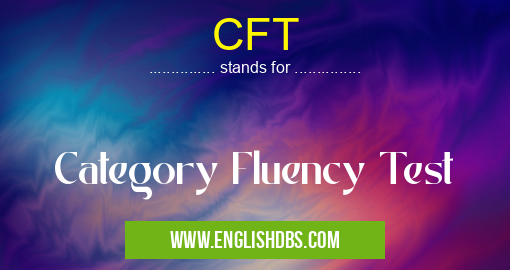What does CFT mean in UNCLASSIFIED
CFT stands for Category Fluency Test. It is a cognitive assessment tool used to evaluate an individual's ability to generate words within a specific category in a limited amount of time. The CFT is commonly employed in neuropsychological evaluations and research studies to assess executive functioning, language skills, and memory.

CFT meaning in Unclassified in Miscellaneous
CFT mostly used in an acronym Unclassified in Category Miscellaneous that means Category Fluency Test
Shorthand: CFT,
Full Form: Category Fluency Test
For more information of "Category Fluency Test", see the section below.
Procedure
The CFT typically involves two parts:
- Letter Fluency: The individual is asked to generate as many words as possible that begin with a specified letter within a given time limit (e.g., one minute).
- Semantic Fluency: The individual is asked to generate as many words as possible that belong to a specific category (e.g., animals, fruits, or verbs) within a given time limit (e.g., one minute).
Interpretation
The results of the CFT are typically scored based on the number of correct words generated within the time limits. Lower scores on the CFT may indicate difficulties with executive functioning, language skills, or memory. However, it's important to note that the CFT is only one part of a comprehensive neuropsychological evaluation and should not be used in isolation for diagnostic purposes.
Applications
The CFT has a wide range of applications in clinical and research settings, including:
- Assessing cognitive functioning: The CFT can be used to identify individuals with cognitive impairments, such as dementia or traumatic brain injury.
- Evaluating language skills: The CFT can help assess an individual's ability to access and retrieve words from memory, as well as their ability to generate words that meet specific criteria.
- Measuring executive functioning: The CFT requires individuals to inhibit irrelevant thoughts and stay focused on the task at hand, which can provide insights into their executive functioning abilities.
Conclusion
The Category Fluency Test (CFT) is a valuable cognitive assessment tool that provides insights into an individual's language skills, memory, and executive functioning. The results of the CFT can assist clinicians and researchers in understanding an individual's cognitive strengths and weaknesses, and inform treatment and intervention plans.
Essential Questions and Answers on Category Fluency Test in "MISCELLANEOUS»UNFILED"
What is the Category Fluency Test (CFT)?
The CFT is a neuropsychological assessment that measures an individual's ability to generate words within a specified category in a limited amount of time. It evaluates cognitive functions such as verbal fluency, semantic memory, and cognitive flexibility.
What is the purpose of the CFT?
The CFT is commonly used to assess cognitive decline and dysfunction, particularly in conditions affecting language and memory, such as dementia, Alzheimer's disease, and aphasia. It can also assist in differential diagnosis and monitoring treatment progress.
How is the CFT administered?
The CFT is typically administered by a trained neuropsychologist or other qualified healthcare professional. The examiner provides the participant with a category (e.g., animals, fruits, occupations) and instructs them to name as many words as possible belonging to that category within a specific time frame (usually one minute).
What are the different types of CFTs?
There are various types of CFTs that vary in the categories used and the number of trials. Common variations include the Letter Fluency Test (LFT), Phonemic Fluency Test (PFT), and Semantic Fluency Test (SFT).
How are the results of the CFT interpreted?
The results of the CFT are typically measured by the number of words generated within the time limit. Lower scores may indicate cognitive impairment, reduced vocabulary, or difficulty with retrieval of semantic information. Patterns of performance across different CFTs can provide additional insights into the underlying cognitive mechanisms affected.
CFT also stands for: |
|
| All stands for CFT |
